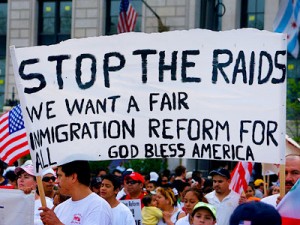If the myth of post-racial politics as propagated by the U.S. mass media after the election of Barack Obama wasn’t already wearing thin, the state of Arizona made sure it was buried once and for all.
In back-to-back actions, the Arizona State Legislature and Governor Jan Brewer not only approved a new law, SB 1070, that criminalizes undocumented immigrants and requires police to check identification and arrest anyone suspected of being in the state without papers, but also outlawed ethnic studies courses in public schools and prohibited teachers with accents (Mexicans) from instructing school children. Earlier, in 2000, Arizona ended bilingual education at a time when the Latino population was expanding rapidly.
“First they came for our bodies,” wrote University of Arizona Professor Roberto Cintli Rodriguez after the latest legislative actions. “Now they come for our souls.”
Arizona’s new education law, which bans courses that advocate the “overthrow” of the U.S. government or create “resentment” against classes or groups of people, should fit in nicely with any future textbooks inspired by the State of Texas’s new curriculum that downplays slavery, rehabilitates Confederate leaders and stresses the importance of the U.S. as a god-fearing, free enterprise-loving society.
Proponents of SB 1070 argue that strong action was needed to control an out-of-control immigration influx and border crime wave ignored by Washington.
After critics blasted the law for encouraging racial profiling, it was modified to prohibit the sole use of race, color or national origin as the principal reason for a police stop and interrogation, but experts feel that this will change little in practice. Additionally, anyone in the company of an undocumented person can conceivably be charged with transporting or concealing an “illegal alien” under the new law.
SB 1070 supporters now resort to legalese in an attempt to convince the public the law won’t infringe on Constitutional rights or make people of color subject to unreasonable stops and seizures.
Governor Brewer’s little-noticed announcement this month that she will allocate $10 million in federal stimulus dollars to enhance “security” in the Arizona border region guarantees more and more people will be subject to stop and interrogation.
The extra funding provides financial incentives to local police agencies for investigating human smuggling, illegal immigration and drug trafficking.
SB 1070 cannot be viewed in isolation from other actions by the same Republican lawmakers and signed into law by the same governor. Investigative journalist Greg Palast writes that when Brewer she served as Secretary of State several years ago, she was implicated in efforts to disenfranchise 100,000 or more overwhelmingly Latino voters after the 2004 election.
Taken together, the Arizona laws resemble the Black Codes passed in the U.S. South immediately after the Civil War. Imposed by defeated slave-holders and whites terrified of losing their skin privilege, the infamous laws attempted to control the movement and residence of the freed slaves, curb voting, and govern overall the relationship between the old master and the “free” negro to the benefit of the former.
Perhaps it’s no accident the Southern Poverty Law Center in 2009 identified 16 racist hate groups active in Arizona, or that Maricopa County Sherriff Joe Arpaio’s lock-ups, which the Inter-American Commission of Human Rights was barred from inspecting.
For backers of SB 1070, the law represents the last stand of a mythic John Wayne America besieged by hordes of dark-skinned invaders supported by whacky, liberals
Repeating the standard litany of complaints against undocumented immigrants for supposedly overburdening social services, straining state budgets and causing violence and mayhem, Pearce reminded readers: “American citizens (whites) are leaving California.” As a solution to the immigration crisis, the Arizona Republican advocates the eventual deportation of all undocumented immigrants through attrition—literally making life so difficult for them in the United States that they are forced to leave.
To finish off the job, Pearce now threatens to introduce legislation that would bar babies born on U.S. soil to undocumented parents from being recognized as U.S. citizens. If approved, such a law would fly in the face of the 14th Amendment to the U.S. Constitution that guarantees citizenship to persons born in the U.S. and represent another challenge by Arizona’s Republicans to the supremacy of federal law. Using racist code-language Pearce has employed the term “anchor babies” to describe children of undocumented immigrants born in the U.S.
Conservatives are well aware that the harassment and repression policies that make up the attrition strategy spill over to U.S. citizens of Latino descent, many of them the original inhabitants of the Southwest. In this sense the attrition strategy could be seen as a racial purging.
The Immigration Reform Backdrop
The unveiling of Arizona’s Brown Codes cannot be understood without examining the bigger economic, political and cultural picture. Despite their generally centrist and even conservative politics, a Black president, Black attorney general and female Homeland Security secretary give sections of the white population the jitters. A hard economic crash and an uncertain recovery have left many people on the edge or in the dumps. Every year, the white population shrinks in proportion to other racial groups.
In early 2010, immigrant advocacy groups pressured the White House and Congress to fulfill 2008 Democratic Party campaign pledges to implement a pathway toward legalization for an estimated 12 million undocumented residents. Church, labor and community activists stepped up lobbying campaigns and staged mass rallies, and some immigrant community leaders vowed to withhold support for the Democrats in this year’s election if a comprehensive immigration reform law was not passed. President Obama took note and, briefly, pledged to work for immigration reform this year.
Then the anti-immigrant offensive kicked into high gear. Seizing the moment, anti-immigrant forces jumped on the murder of Arizona rancher Robert Krentz in late March. Although news stories and the blogosphere pointed the finger at an “illegal alien,” no one has been arrested for the crime and the identity of the real killer(s) remains unknown. Interestingly, the murder occurred only days after a nativist Minutemen group announced it was returning to the Arizona border to conduct armed patrols.
Facing a primary election challenge from the right, chameleon Arizona Senator John McCain, who once supported comprehensive immigration reform, demanded thousands of National Guard troops be dispatched to the U.S.-Mexico border- in spite of widespread evidence even the Los Angeles Times recently documented that, contrary to the drug-fanned violence on the Mexican side of the border, the U.S. side is largely safe and even more peaceful than many communities in the interior of the country.
Even after President Obama announced that he would dispatch 1,200 National Guardsmen to the southern border and request an additional $500 million for “border security”, McCain still complained it wasn’t enough to clamp down on the region.
Existing crime statistics on the border contradict the “spillover violence” theory and the idea that undocumented migrants are responsible for a crime wave, but reality rarely plays into the anti-immigrant messaging.
In what has all the hallmarks of an orchestrated campaign, nativists, restrictionists and racists have been calling Congressional offices, ranting on talk radio and flooding the Internet and editorial pages all spring. They frequently demonize undocumented migrants as welfare cheats, illegal voters, anchor babies, economic leeches, drug dealers and criminals. Mass deportation is the rallying cry, and immigration reform the common enemy.
Most remarkable is how gutter rhetoric and outright poppycock drives and shapes U.S. immigration policy. As in 2006-2007, prospects for immigration reform are being negotiated in terms dictated by the right.
Rolled out earlier this year, the Schumer-Graham blueprint for immigration reform in the U.S. Senate emphasized tighter border “security,” a guest worker program, the expansion of the controversial E-Verify employment eligibility system, a biometric Social Security card, and a “tough but fair” path to legalization for undocumented residents.
Although some immigrant advocacy groups viewed Schumer-Graham as a step forward from the legislative swamp, others like the Oakland-based National Network for Immigrant and Refugee Rights warned Schumer-Graham would foster racial profiling, increase the separation of families and result in more “tragic deaths” along the border as a heightened border clamp-down funnels desperate migrants into online casino increasingly dangerous crossings.
The American Civil Liberties Union criticized the senators’ proposal for biometric worker identification as a “thinly-disguised” attempt to implement a national ID. “It is unacceptable to force every American worker to be fingerprinted in order to work,” said the ACLU’s Christopher Calabrese. For civil libertarians, the Schumer-Graham proposal and the Arizona Brown Codes, are huge steps forward in the creation of a U.S. police state.
Democratic politicians, meanwhile, seem hell-bent on proving who is tougher when it comes to border security. Similar to the Bush years, immigration reform and a pathway to legalization are contingent on “securing” the border, cracking down on employers of undocumented migrants and making residency and citizenship as arduous a task as possible.
Joe Sestak, a former navy admiral and the new Democratic nominee for Arlen Specter’s Pennsylvania Senate seat, recently summed up the dominant line in Washington when he said undocumented immigrants would have to “get to the back of the line” when processed through the decrepit immigration system.
Interviewed at a recent pro-immigrant rally in El Paso, City Council Representative Susie Byrd conceded many fellow Democrats from outside the border region do not fully grasp the all issues at stake in the immigration reform debate or the daily realities of millions of people living along the U.S.-Mexico frontier. Consequently, Byrd asserted, many wind up supporting local policing policies, gargantuan fencing projects and other militaristic solutions that trample on the public’s freedom of movement.
“We have to really be careful on the local level, on the U.S.-Mexico border, to make sure that immigration reform does not come at the expense of our community,” Byrd said, adding that the flow of goods and people from one side of the border to the other could be further disrupted by a policing priority.
Overturning the Brown Codes
While immigration reform flutters in the winds of Washington, pro-SB 1070 forces aim to export their law to other states. To counter a growing boycott of Arizona launched by SB 1070 opponents, backers of the measure plan a “Shop in Arizona Week” in June.
Meanwhile, pro-deportation advocates like Russell Pearce could find solace in the Obama administration’s continued (record) detentions and deportations of large numbers of immigrants, which reached nearly 400,000 individuals in 2009, according to the immigrant advocacy group America’s Voice.
On the other hand, opposition to SB 1070 and its companion codes is spreading like wildfire from Arizona and the U.S. Southwest to Mexico and other nations. A demonstration against SB 1070 was even convened in Ecuador, and denunciations of the law have come from as far away as Russia and Poland. Top-name entertainers including Shakira, Los Tigres del Norte and Jaguares have lent their names and talents to the cause.
The controversy has even struck a nerve center of U.S. culture-baseball. Now heavily Latino, baseball has become an important arena for the fight, with many Major League players speaking out against SB 1070 and a movement is picking up steam to yank the 2011 All-Star game from Phoenix. Numerous demonstrations have followed the Arizona Diamondbacks on spring road trips this year.
Major professional organizations like the 10,000-member American Anthropological Association have vowed to not attend conferences in Arizona as long as SB 1070 stands. Speaking on public radio in New Mexico, Arizona state senator Richard Miranda, a critic of the law, said he did not think Governor Brewer and the Republicans realized the extent of the “backlash” or economic impact SB 1070 would unleash. “The opposition to this isn’t going away,” Miranda said.
Ranging from civil disobedience to legal challenges and to boycotts, actions against SB 1070 are being organized by a broad span of groups in the U.S. and abroad.
Next November, the State of Arizona will be tried before an international popular tribunal in Mexico City endorsed by deported U.S. immigrant activist Elvira Arellano and scores of other prominent advocates, including individuals associated with the Farm Labor Organizing Committee and the Service Employees International Union.
In addition to the May 29 mass march in Arizona, another large mobilization is planned for the state on Aug. 29, the 40th anniversary of the 1970 Chicano Moratorium against the Vietnam War. To a large extent, spontaneous energy is flowing from the outrage.
Ultimately, the defeat of Arizona’s Brown Codes will depend on the concerted mobilization of many groups and sectors in the U.S. and across the Americas, as well as more focused strategies to undermine the false messages coming out of the anti-immigrant movement.
For now, it remains to be seen if the Arizona State Legislature and Gov. Brewer–paradoxically, the modern-day claimants to the Party of Lincoln–will inspire the reactionary forces much like South Carolina did in 1861 and trigger an even bigger political crisis across the United States, or if they will experience the contemporary, figurative equivalent of the fate suffered Confederate forces which briefly annexed Arizona during the Civil War.
In that episode, the pro-slavers were overwhelmed and outmaneuvered by California volunteers, harassed by Apaches and finally defeated by New Mexican militia before retreating to Dixie Land.
Kent Paterson is a freelance journalist who covers the southwestern United States, Mexico, and Latin America. He is an analyst for the Americas Program at www.americas.org
For more information:
Calderón Schmoozes, Mexico Loses
https://www.americas.org/archives/2459
The Shadow Prison Industry and Its Government Enablers
https://www.americas.org/archives/1995
Profits, Poverty, and Immigration Converge





